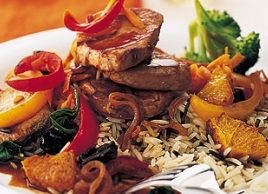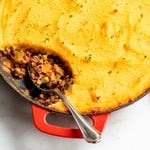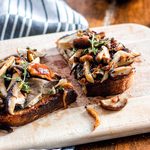Pork Medallions with Peppers
This quick sauté of pork medallions and peppers makes an excellent dinner party dish, with its well-balanced sweet and sour elements coming from balsamic vinegar, oranges and olives. It is especially good’and extra nutritious’served with broccoli.
Source: Cook Smart for a Healthy Heart, Reader’s Digest Canada

| Servings | Prep Time | Cook Time |
| 4servings | 25minutes | 25minutes |
| Servings | Prep Time |
| 4servings | 25minutes |
| Cook Time |
| 25minutes |
- 2 cups mixed basmati and wild rice
- 2 1/3 cups boiling water
- 2 oranges
- 1 tbsp extra virgin olive oil
- 350 g pork fillet sliced across into medallions 1 cm thick
- 1 large red onion halved lengthwise and thinly sliced into half rings
- 1 red pepper seeded and sliced into strips
- 1 yellow pepper seeded and sliced into strips
- 1 large carrot grated
- 1 garlic clove finely chopped
- 1/3 cup freshly squeezed orange juice
- 4 tbsp balsamic vinegar
- 1/4 cup pitted black olives chopped or sliced
- 1/2 cup fresh basil leaves
- pepper to taste
|
Ingredients
Servings: servings
Units:
|
- Place the rice in a saucepan and pour over the boiling water. Bring back to a boil, then reduce the heat to low. Cover and simmer for about 15 minutes, or according to the package instructions, until the rice is tender and all the water has been absorbed.
- Meanwhile, peel the oranges and cut them crosswise into slices about 1 cm thick. Stack the slices 3 or 4 at a time and cut into quarters. (If possible, use a chopping board with a well to catch the juices.) Set the orange slices and juice aside.
- Heat the oil in a large nonstick frying pan over medium-high heat. Cook the pork medallions, in batches, for 2–3 minutes on each side. Remove the meat with a slotted spoon and set aside.
- Reduce the heat to medium and add the onion, pepper strips, carrot and garlic to the pan. Cover and cook, stirring frequently, for 5–6 minutes or until the vegetables start to soften. Add 2 tablespoons water, then the orange juice and balsamic vinegar. Stir well to mix. Cover and cook for 3–4 minutes or until the vegetables are tender.
- Return the pork medalions to the pan. Add the olives, orange slices and their juice and the basil leaves. Cook for 1 minute to reheat the pork, stirring well. Add pepper to taste.
- To serve, divide the rice among 4 warmed plates and place the pork medallions, peppers and other vegetables on top. Drizzle over any juices remaining in the pan and serve immediately.
Per serving: 534 calories, 38 g protein, 9 g total fat, 2 g saturated fat, 112 mg cholesterol, 74 g total carbohydrate, 16 g sugars, 7 g fibre, 149 mg sodium
Wild rice is not a true rice, but the seeds of a wild aquatic grass. It is gluten-free, like the basmati rice it is mixed with here, and contains useful amounts of B vitamins, particularly niacin, as well as dietary fibre.




